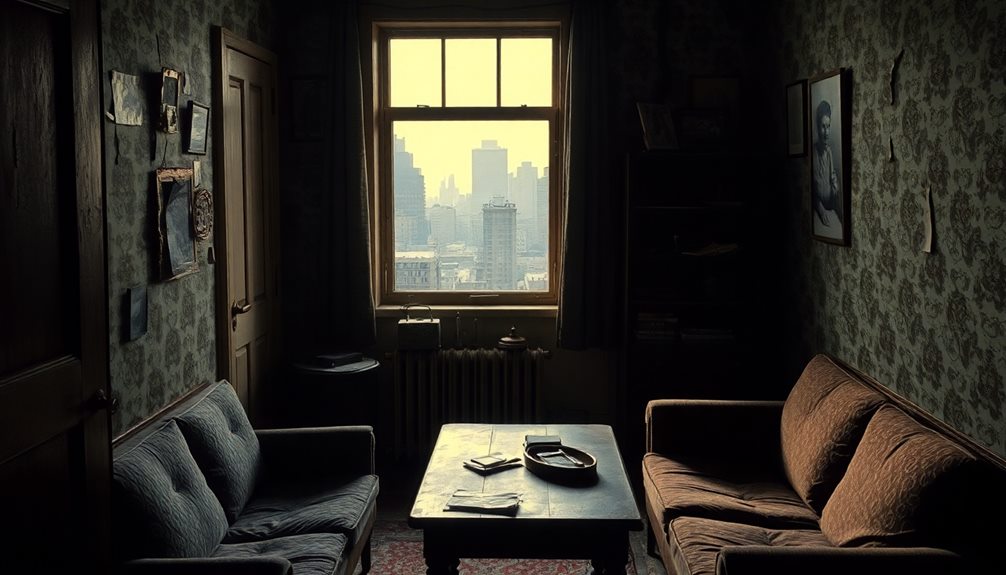*Native Son* was published in 1940 by Richard Wright. This powerful novel highlights the struggles of Bigger Thomas, a young Black man in 1930s Chicago, during a time marked by systemic racism and economic hardship. The Great Migration led many African Americans north, but opportunities remained scarce amid the Great Depression. The book sparked intense discussions about race and identity, selling 250,000 copies within three weeks. Its controversial content even led to bans in some places. If you explore further, you'll uncover more about its themes and the historical context that shaped this influential work.
Overview of Native Son
Many readers find *Native Son* to be a powerful exploration of race and identity in America. Published in 1940 by Richard Wright, the novel centers on Bigger Thomas, a young Black man maneuvering life in poverty on Chicago's South Side during the 1930s.
Through Bigger's experiences, Wright tackles the harsh realities of systemic racism and societal oppression faced by African Americans, illustrating how racism shapes Bigger's actions and sense of identity. As you probe into the narrative, you'll witness how Bigger grapples with his environment, which is steeped in racial prejudice and economic hardship.
This raw portrayal not only highlights the psychological effects of racism but also serves as a critique of the societal structures that perpetuate injustice. *Native Son* quickly became a bestseller, selling 250,000 copies within three weeks of its release, reflecting its cultural impact and relevance.
However, the book didn't come without controversy; its graphic depictions of violence, profanity, and racial slurs led to bans in some schools and libraries.
Despite these challenges, Wright's work remains a significant piece of literature that continues to spark discussions about race relations and the urgent need for societal change.
Historical Influences
The backdrop of *Native Son* is shaped by the profound historical influences of the 1930s, a time when systemic racism and economic despair were rampant in America. Richard Wright wrote this powerful narrative against the stark realities faced by Black people during the Great Depression. The societal challenges, including rampant poverty and limited opportunities, particularly in urban areas like Chicago, profoundly influenced the character of Bigger Thomas and the story's themes.
The collective struggle against oppression during this era resonates with the bravery demonstrated by those involved in various resistance movements, which exemplified the fight for justice and equality in the face of tyranny, as seen through acts of courage and defiance.
Wright's depiction of Bigger reflects the struggles of African Americans grappling with institutionalized racism in America. The failure of an anti-lynching bill in Congress during this time highlighted the deep-rooted racism that permeated society, further intensifying the urgency for racial equality.
This historical context fueled Wright's exploration of the psychological impacts of oppression, making Bigger's actions both tragic and a response to the societal constraints imposed on him.
In crafting *Native Son*, Wright not only illustrated the plight of Black Americans amid the Great Depression but also gave voice to the broader fight against racism, making his work a critical reflection of the era's injustices.
Living Conditions in the 1930s

During the 1930s, around three million people called Chicago home, but for African Americans, life was often a struggle against overwhelming odds. Many migrated to the city during the Great Migration, seeking better economic opportunities and an escape from the oppressive Jim Crow South. Despite this hope, most found themselves trapped in poverty, particularly in the segregated Black Belt neighborhood.
The historical context of this era resonates with the experiences of characters in literature, such as Liesel Meminger from *The Book Thief*, who also faced immense challenges and oppression in her environment. The living conditions were dire. You'd see overcrowded housing, with families crammed into one-room apartments, sharing space with rodents and suffering from inadequate sanitation.
Economic hardships from the Great Depression only worsened the situation, amplifying existing racial inequalities. Limited employment opportunities meant that most jobs available favored white workers, pushing African Americans into low-paying, demeaning positions.
Systemic discrimination impacted every aspect of life, from housing to healthcare. As an African American in Chicago during this era, you faced not just the struggle for survival but a constant battle against the societal barriers that kept you from achieving true equality.
The harsh realities of this time laid the groundwork for the compelling narratives found in works like "Native Son" and serve as a reminder of the resilience demonstrated by individuals confronting oppression, akin to the courage shown by characters in the Holocaust narrative.
Opportunities and Organizations
In the 1930s, opportunities for African Americans in Chicago were sparse, yet organizations emerged to combat the pervasive injustices they faced. Amid the Great Depression, the Congress of Industrial Organizations (CIO) championed labor rights, seeking better working conditions for African American workers. Despite this, barriers to employment and advancement remained significant, often relegating African Americans to low-paying jobs or subjecting them to discrimination.
As Ta-Nehisi Coates highlights in his reflections on systemic oppression, the struggle for equity in various aspects of life, including labor and education, has deep roots in American history, emphasizing the need for communities to unite and advocate for change systemic racism and historical legacies.
- The rise of community organizations addressing social and economic injustices.
- The struggle for broader labor rights amidst economic hardship.
- Systemic issues limiting access to quality education and well-paying jobs.
- Efforts to combat poverty through organized advocacy.
- The impact of these organizations on future civil rights movements.
These organizations aimed to provide support and resources, but progress was slow, often hindered by systemic issues. The limited job opportunities available to figures like Bigger Thomas in Native Son mirrored the harsh reality faced by many African Americans.
The intertwined challenges of poverty, discrimination, and lack of education created a cycle that was hard to break. However, the emergence of these organizations laid the groundwork for future advancements in the fight for equality.
Justice and Inequality

Racial bias seeped into every corner of the 1930s criminal justice system, leaving African Americans vulnerable to systemic injustices. Richard Wright's *Native Son* powerfully illustrates this reality through the character of Bigger Thomas, who faces a biased trial steeped in societal prejudice.
The harsh consequences of oppressive systems, as seen in the struggles of individuals like Otto and Anna Quangel in small acts of defiance, further emphasize the urgent need for resistance against tyranny. Bigger's sentencing to death serves as a stark reminder of how the justice system prioritizes race over equity, reflecting broader societal attitudes towards African Americans.
The high-profile case of the Scottsboro Boys, wrongfully convicted in the 1930s, further highlights the pervasive inequality and injustice faced by Black individuals. Wright critiques the superficiality of white philanthropy, emphasizing that well-meaning actions often fail to address the root causes of systemic issues.
Instead of fostering real change, these efforts merely mask the ongoing struggles for justice and equality.
In this historical context, the fight for civil rights and equality remains a persistent challenge for marginalized communities. *Native Son* acts as a lens through which you can examine the injustices of the time, urging you to confront the complexities of race, power, and humanity in a society riddled with inequality.
Conclusion
As you close the pages of "Native Son," a chill creeps in, echoing the harsh realities of the 1930s. The stark contrasts of opportunity and despair linger in your mind, painting a haunting picture of justice denied. You can almost hear the whispers of those who fought for change, their voices a reminder that history isn't just a backdrop—it's a living, breathing force. Will you let their struggles fade, or will you carry their legacy forward?



